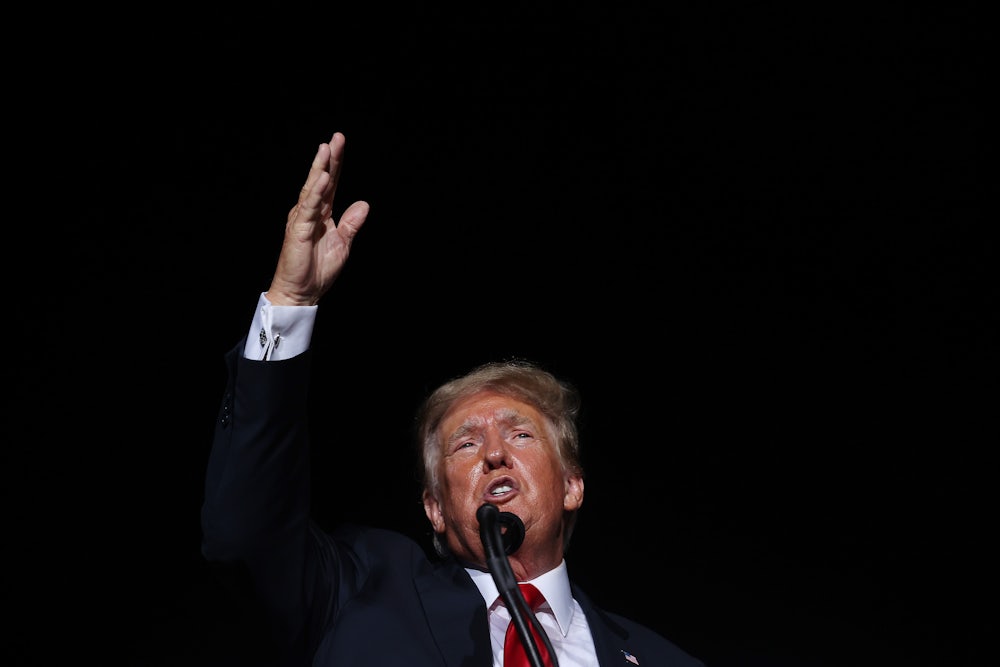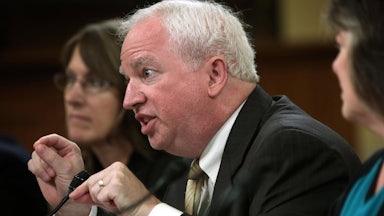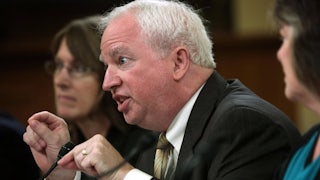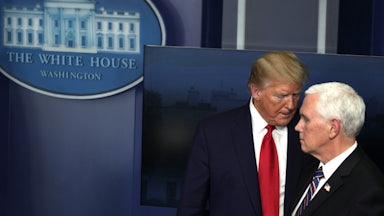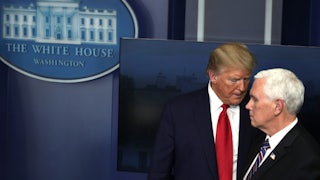Earlier this month, Trump lawyer John Eastman told a federal court in California that if it ruled against him in his legal battle against the House January 6 committee, it “may be the first formal finding of presidential criminality by a federal court in United States history.” On Monday, Judge David Carter fulfilled his prediction.
“If Dr. Eastman and President Trump’s plan had worked, it would have permanently ended the peaceful transition of power, undermining American democracy and the Constitution,” Carter wrote in a 44-page ruling in Chapman v. Thompson. “If the country does not commit to investigating and pursuing accountability for those responsible, the Court fears January 6 will repeat itself.”
At issue in this case is whether Eastman must comply with a subpoena issued by the January 6 committee. The committee has sought a series of documents—mostly things that Eastman had emailed on his Chapman University account, where he taught constitutional law—that may be relevant to its inquiry into the insurrection. Eastman argued that because he was former President Donald Trump’s lawyer at the time, the materials were covered by attorney-client privilege and some associated protections.
The committee countered that the emails were not covered by the privilege because of what’s known as the crime-fraud exception, which generally holds that lawyers can’t help their clients do ongoing and future crimes. If you rob a jewelry store, then call your lawyer and tell them what happened, and the lawyer takes down notes about it, prosecutors generally can’t seize those notes and use them as evidence. If, on the other hand, you call your lawyer before robbing a jewelry store, and your lawyer writes a memo on how to do it before the cops arrive, prosecutors can generally use that memo at trial. (Please do not use this metaphor to rob any jewelry stores or advise clients to do so; it is for illustrative purposes only.)
Eastman’s famous memos were about stealing something slightly more valuable: the American presidency. He laid out a pseudo-legal argument for then–Vice President Mike Pence to declare unilaterally that Trump had won the 2020 election during the January 6 joint session of Congress. Failing that, he argued that Pence could send it back to the state legislatures for further review, apparently in the hopes that pro-Trump lawmakers would legitimize the putsch. But Pence refused to help carry out the plot, leading Trump to tell his supporters on January 6 to “march down Pennsylvania Avenue” and express their rage at Pence and Congress.
Monday’s ruling is notable on two levels. First, it makes available more of Eastman’s records for the January 6 committee. Carter ruled in favor of turning over roughly 100 documents to the committee, only withholding fewer than a dozen of them on privilege grounds. What exactly is on these documents is not clear. But it’s possible that they will shed more light on how the plot against America took shape in the frenzied months between Election Day and January 6, 2021.
One of the documents appears to tie Eastman’s efforts to Rudy Giuliani’s quixotic campaign to overturn the results in court. Carter gave a brief description of it while he reviewed the potentially privileged material, all of which he read. “This may have been the first time members of President Trump’s team transformed a legal interpretation of the Electoral Count Act into a day-by-day plan of action,” the judge wrote in his ruling. “The memo is both intimately related to and clearly advanced the plan to obstruct the joint session of Congress on January 6, 2021.” Its exact contents are, as of yet, unknown; Carter’s reaction suggests that they may be somewhat hair-raising.
Second, and perhaps most importantly, Carter’s ruling effectively lays out a theory of prosecution for Trump himself. There is no specific federal law stipulating that it’s illegal for the president to urge his supporters to storm the Capitol, disrupt the Electoral College certification, and attempt to lynch the vice president. But the January 6 committee previously identified three federal crimes that Trump may have committed as part of the insurrection: obstruction of an official proceeding, conspiracy to defraud the United States, and common-law fraud. Carter found in each of the three cases that it was “more likely than not” that Trump had committed the offenses.
Some of those charges have requirements that, at first blush, might be difficult to prove in court. But Carter found enough support for the charges to defeat Eastman’s challenge. The obstruction count, for example, would require a prosecutor to prove corrupt intent on Trump’s part. Trump appeared to genuinely believe, at least in public, that the election was stolen from him. But a review of his private actions undercut that belief. For one, the election was not only not stolen, but countless state, local, and federal officials told him that it wasn’t. What’s more, Trump undercut his defense here by infamously pressuring Georgia Secretary of State Brad Raffensperger to “find” him enough votes to win the state. So did Eastman by telling Pence’s lawyer, at one point, that they were no longer playing by “Queensbury rules,” referring to the nineteenth-century code of rules for boxing matches, and, by extension, the rule of law.
Carter laid out the conclusions in a remarkably sharp tenor for a federal judge. “The illegality of the plan was obvious,” he wrote. “Our nation was founded on the peaceful transition of power, epitomized by George Washington laying down his sword to make way for democratic elections. Ignoring this history, President Trump vigorously campaigned for the Vice President to single-handedly determine the results of the 2020 election.” The judge effectively concluded that Eastman’s legal arguments, as well as Trump’s many legal battles, were a fig leaf to seize the republic by executive fiat.
There are limits to Carter’s ruling. He reached this conclusion in a civil lawsuit, so it does not have direct implications for any criminal charges that could be brought against Trump. But his ruling does bolster the case for prosecuting the former president—and place additional pressure on the Justice Department to do so. With the apparent collapse of the Manhattan district attorney’s case against Trump for his dubious business activities, his role in the insurrection is now the most significant source of legal peril for him.
How likely is it that the Justice Department will bring any charges? That is unclear. Attorney General Merrick Garland insisted in January that federal prosecutors would pursue those responsible for January 6 “at any level,” implying that a case against Trump is not off the table. At the same time, federal prosecutors might be reluctant to bring such a politically potent case without sufficient evidence, and that evidence may not be possible to obtain. Trump foiled previous investigations by cajoling potential witnesses with possible pardons if they refused to cooperate with the authorities, as well as political or professional exile if they “flipped” on him.
Monday’s ruling is also not the end of the legal battles. The Eastman lawsuit could be an early test of whether Justice Clarence Thomas will recuse himself from January 6 cases. Multiple news outlets reported last week that his wife, Ginni Thomas, had texted with White House chief of staff Mark Meadows in support of efforts to overturn the 2020 election. Those efforts culminated in the attack on the Capitol. Earlier this month, she admitted that she was present at the rally on the White House Ellipse that morning, though she claimed she left before Trump began speaking.
Thomas previously cast the only recorded dissenting vote in Trump v. Thompson, a last-ditch bid by the former president to stop the National Archives from turning over a tranche of Trump White House records to the committee. Democratic senators have already called on Thomas to recuse from cases where his wife’s involvement could compromise his integrity. Whether Thomas recuses himself from this particular case may have no effect on the outcome. But it would be an important signal for the rule of law, which this case has already shown is not as strong as many Americans think.
